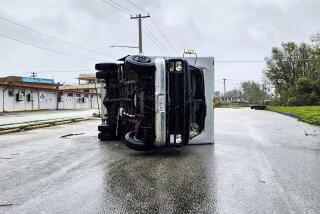Soviet Defense Chief Condemns Anti-Draft Forces
- Share via
MOSCOW — Soviet Defense Minister Dmitri T. Yazov, confronted by a growing movement against the draft, lashed out at “anti-army manifestations” and ruled out change in conscription rules, the Tass news agency said Sunday.
The report came a day after the Latvian Supreme Soviet, in a move that carried more symbolic than legal force, voted to allow alternative service to conscientious objectors in the Baltic republic.
The official news agency said Yazov “condemned anti-army manifestations that recently spread in some regions of the country--calls to refuse service in the army, attempts to evade call-up into the armed forces, blockade of call-up stations, etc.”
The Tass report indicated Yazov is not receptive to proposals from groups in various Soviet republics to allow soldiers to serve only in their home regions. He said the draft “would continue to develop according to the principles of extraterritoriality.”
Nearly all Soviet men between 18 and 25 years old are required to serve at least two years in the armed forces. Students were granted deferments and partial exemptions from service this year. But Yazov and Marshal Sergei F. Akhromeyev, President Mikhail S. Gorbachev’s top military adviser, have made clear that there will be no shift to a volunteer army in the near future.
The Soviet Union has a standing army of about 4 million.
Yazov cited the Baltic region, the Caucasus republics and parts of Moldavia, where he said anti-draft actions are strongest.
In the Caucasus republic of Georgia, more than 200 youths protesting the draft have been staging sit-ins near government buildings recently, activists said.
Popular fronts in Latvia, Estonia and Lithuania are pushing for their youths to serve only in the Baltics, and a small group of protesters backing such regional service demonstrated in front of the Estonian Parliament in Tallinn over the weekend.
Azerbaijani, Latvian and activist groups in other areas charge that too many of the republics’ youths die in the service.
More to Read
Sign up for Essential California
The most important California stories and recommendations in your inbox every morning.
You may occasionally receive promotional content from the Los Angeles Times.









